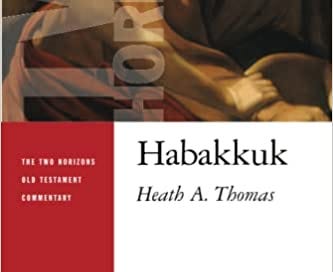New Commentary on Habbakuk
Thomas, Heath A. Habakkuk.
The Two Horizons Old Testament Commentary.
Grand Rapids: Eerdmans, 2018. Amazon Logos
Reviewed by Andy Judd
The economics of commentary writing means that seldom does a “minor” prophet like Habakkuk get his own volume. Normally he’ll be asked to share a room with Nahum or Zephaniah and even Jonah. Given that Habakkuk is such a distinctive treasure with a significant contribution to biblical theology, it’s delightful when commentary series devote a full volume to this worthy book. After all, Habakkuk is incredibly important in the scheme of things - his comment that ‘the righteous will live by faith’ has made more than one splash into the New Testament pond.
Heath Thomas is working hard in this commentary to reverse some of the unfounded hostility towards Habakkuk in the broader church tradition. Alongside a solid engagement with textual and critical issues, Thomas aims to provide a theological interpretation of the text in light of the belief that the Scriptures disclose Christ. This is interpretation in the fullest sense – the way it should be – which spans the historical context, the literary shape and the hearts and minds of readers today.
The introduction gives us a helpful orientation to the field, with comments on method as well as the purpose and identity of the prophet. He gives a very sound treatment also of the literary context of the work, situating it within the Twelve but also focusing on what the book of Habakkuk has to say in itself. He also explains why he read the book against the context of the reign of Jehoiakim with 5 pages of helpful discussion. The footnotes allow readers to follow up some of the main players in the discussion without being distracted by the historiographical issues. I was particularly encouraged to see 14 pages of reception history as part of the introduction.
In the commentary proper, each chapter of Habakkuk gets a reliable (if a little cautious) translation. Then comes a summary of the main features and issues involved. The commentary itself tackles significant textual issues, poetic features and the theology of the sections. It tends to refer readers elsewhere for extended technical discussion but includes enough detail to understand the issues involved. Hebrew words are supplied alongside their transliteration and translation. Given the focus on theological interpretation and application this is about the right level of technical detail, and it should be accessible for most intermediate readers.
The second part of the book is a collection of essays on particular topics relating to Habakkuk. The first introduces the major themes of Habakkuk in light of biblical theology, and then shows how they are picked up in the NT. Separating this from the commentary proper is a great way of dealing with the bigger picture, because often this kind of synthesis is the missing step in pure exegetical commentaries. The second essay is on Habakkuk and prayer, with particular attention to the recreation of shalom in the kingdom of God. The final essay is on Habakkuk and spiritual formation, which brings some of these strands together in the more applied theological area of ministry to the shaping of our selves and others in light of Christ.
The book ends with a good bibliography, author index, brief subject index and a Scripture index.
This is an exciting resources to help students and Bible teachers engage with the book of Habakkuk as Scripture. I do hope more people will be emboldened to schedule teaching series in their churches.




